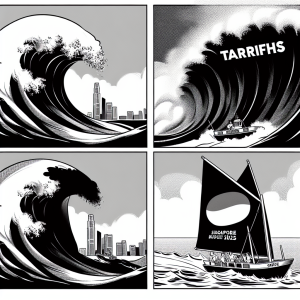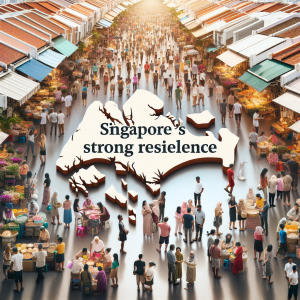As Singapore prepares for its upcoming elections on May 3, 2025, the nation faces significant economic challenges that are shaping the political landscape. Rising living costs and the ongoing trade war between major global powers are exerting pressure on the government and its citizens, prompting a call for decisive action and policy reform.
The cost of living in Singapore has become a pressing concern for many residents. With housing prices remaining among the highest in the world, coupled with inflationary pressures affecting various sectors, the financial strain on households is palpable. In response, the Singaporean government has introduced measures such as housing grants and subsidies aimed at alleviating some of these burdens. These initiatives reflect a broader commitment to ensure that essential living costs remain manageable for the average citizen.
In addition to domestic challenges, Singapore’s economy is intricately linked to the global landscape, particularly in the context of international trade. The ongoing trade tensions, especially between the United States and China, have created an atmosphere of uncertainty that significantly impacts Singapore’s trade-dependent economy. As a strategic trade hub, Singapore is taking proactive steps to diversify its trade partnerships and explore new markets, thereby reducing reliance on any single economy. This shift is crucial for maintaining economic stability amid global disruptions and trade wars.
Government Strategies and Future Outlook
To further bolster its economic resilience, Singapore is focusing on innovation and technological advancement. The government is investing heavily in sectors such as digital technology and green energy, recognizing these areas as vital for future growth. By fostering an environment conducive to innovation, Singapore aims to not only navigate current economic challenges but also position itself as a leader in sustainable economic practices.
As the May elections approach, the government’s strategies to address living costs and trade pressures will undoubtedly be at the forefront of political discourse. Voters are likely to prioritize candidates who demonstrate a clear understanding of these issues and propose actionable solutions. The proactive measures already in place reflect the government’s commitment to maintaining Singapore’s status as a leading global economic hub while ensuring the welfare of its citizens.
In conclusion, Singapore’s upcoming vote is not just a political event; it represents a critical juncture in the nation’s economic journey. The interplay between rising living costs, trade dynamics, and government strategies will shape the outcomes of this election and the future of Singapore’s economy. As the country navigates these complexities, its adaptability and strategic foresight will be essential in overcoming the challenges that lie ahead.





